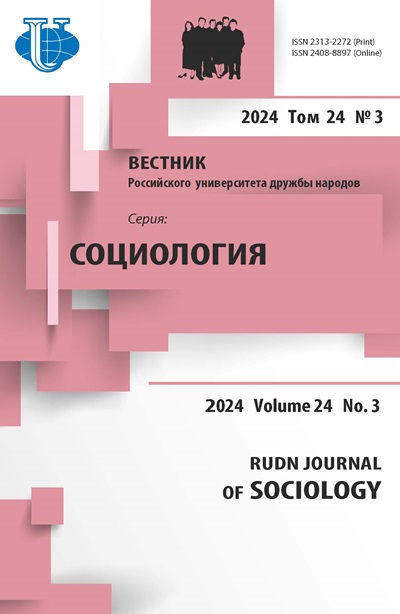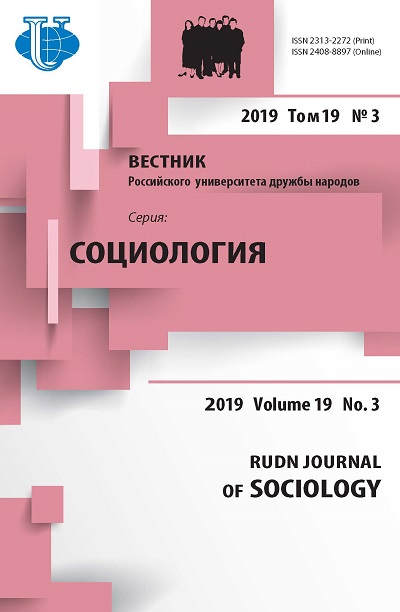Факторы депривации пожилых людей в социально-трудовой сфере: региональный аспект
- Авторы: Кошарная Г.Б.1, Щанина Е.В.1
-
Учреждения:
- Пензенский государственный университет
- Выпуск: Том 19, № 3 (2019)
- Страницы: 481-493
- Раздел: Массовые опросы, эксперименты, кейс-стади
- URL: https://journals.rudn.ru/sociology/article/view/21682
- DOI: https://doi.org/10.22363/2313-2272-2019-19-3-481-493
Цитировать
Полный текст
Аннотация
Проблема социальной депривации и эксклюзии пожилых людей становится актуальной не только для России, но и для многих европейских стран. Цель статьи - оценка факторов риска депривации пожилых людей в сфере социально-трудовых отношений на основе теоретико-методологического анализа концепций классиков социологической мысли, современных отечественных и зарубежных социологов, исследующих вопросы социальной депривации. Обобщив теоретико-методологические подходы, авторы разработали факторную модель депривации пожилых людей в социально-трудовой сфере. Используя эту модель, а также результаты социологических исследований, проведенных в 2017-2018 годы методом анкетного опроса в Пензенской и Саратовской областях и Республике Татарстан, авторы проанализировали факторы депривации пожилых людей в сфере труда. В статье подчеркивается, что пожилые люди представляют неоднородную социальную группу, часть которой является объектом социальной политики, защиты и обеспечения, а другая - активным субъектом социальных взаимодействий. Депривация пожилых людей зависит от внешних и личностных факторов, которые имеют объективный или субъективный характер. По данным эмпирических исследований, показаны наиболее значимые депривирующие факторы пожилых людей в социально-трудовой сфере - возраст, уровень образования, место жительства, социально-профессиональный статус до пенсионного возраста, самооценка здоровья и уровня жизни, восприятие своей востребованности на рынке труда, а также положение пожилых людей на рынке труда с позиций работодателей. Результаты исследования позволили выделить сферы деятельности, в которых трудовая занятость пожилых людей наиболее востребована: здравоохранение, торговля и производство, в то время как сфера информационных технологий для них закрыта. Преодолению факторов депривации способствует выбор и реализация стратегий поведения, соответствующих модели активного долголетия.
Об авторах
Галина Борисовна Кошарная
Пензенский государственный университет
Автор, ответственный за переписку.
Email: k-galina1@yandex.ru
доктор социологических наук, заведующая кафедрой социологии и управления персоналом Пензенского государственного университета
ул. Красная, 40, Пенза, 440026, РоссияЕкатерина Владимировна Щанина
Пензенский государственный университет
Email: shchanina@mail.ru
доктор социологических наук, профессор кафедры социологии и управления персоналом Пензенского государственного университета
ул. Красная, 40, Пенза, 440026, РоссияСписок литературы
- Абрахамсон П. Социальная эксклюзия и бедность // Общественные науки и современность. 2001. № 2.
- Авраамова Е., Логинов Д. Социальное самочувствие и возможности самореализации: расслоение доходных и возрастных групп населения // Экономическое развитие России. 2018. Т. 25. № 11.
- Аникин В.А. Тихонова Н.Е. Бедность и неравенство в странах БРИКС: российская специфика // Общество и экономика. 2016. № 1.
- Антонова В.К. Концепты социальной инклюзии и эксклюзии в глобальном обществе: дрейф по социальным институтам, акторам и практикам // Журнал исследований социальной политики. 2013. Т. 11. № 2.
- Бабич Н.С. Статус типологического метода в эмпирических исследованиях социального неравенства // Современные исследования социальных проблем. 2012. № 9.
- Бородкин Ф.М. Социальные эксклюзии // Социологический журнал. 2000. № 3-4.
- Гарр Т.Р. Почему люди бунтуют. СПб., 2005.
- Голенкова З.Т. Избранные труды. М., 2014.
- Горшков М.К. Российское общество как оно есть (опыт социологической диагностики). В 2-х тт. Т. 2. М., 2016.
- Григорьева И.А., Парфенова О.А., Петухова И.С. Занятость и социальное исключение пожилых граждан (обзор европейских конференций) // Социологические исследования. 2018. № 5.
- Григорьева И.А., Петухова И.С. Сокращение социального исключения лиц пожилого возраста // Журнал социологии и социальной антропологии. 2018. Т. 21. № 2.
- Дмитриева А.В. Социальное включение/исключение как принцип структурации современного общества // Социологический журнал. 2012. № 2.
- Елютина М.Э., Болотов Г.И. Повседневная жизнь пожилой семьи: стратегия планирования и жесткой экономии ресурсов // Известия Саратовского университета. Серия: Социология. Политология. 2017. Т. 17. № 1.
- Елютина М.Э. Социальная экзистенция старости: архив мнений. Саратов, 2017.
- Ефлова М.Ю. Социальное исключение депривированных групп в современном обществе // Вестник экономики, права и социологии. 2015. № 1.
- Инклюзия как принцип современной социальной политики в сфере образования: механизмы реализации / под ред. П. Романова, Е. Ярской-Смирновой. М., 2008.
- Козырева П.М., Смирнов А.И. Масштабы и динамика социально-экономического неравенства в современной России // Россия реформирующаяся. 2018. № 16.
- Корнилова М.В. Инновации и риски мониторинга уровня и качества жизни пожилых москвичей: анализ материалов фокус-дискуссии // Вестник НГУЭУ. 2017. № 1.
- Корнилова М.В. Социальное обслуживание как способ защиты пожилых москвичей от социальных рисков // Социальная политика и социология. 2017. Т. 16. № 3.
- Кошарная Г.Б., Щанина Е.В. Особенности обучения пожилых людей // Интеграция образования. 2013. № 4.
- Максимова С.Г., Ноянзина О.Е., Максимова М.М., Щеглова Д.К. Социальная эксклюзия лиц старших возрастных групп: социально-экономические аспекты // Вестник Алтайского государственного аграрного университета. 2015. № 5.
- Маршалл Т.Х. Ценностные проблемы welfare-капитализма // Журнал исследований социальной политики. 2010. Т. 8. № 4.
- Москвин Л.Б. Проблема выравнивания неравенства в современном обществе // Социально-гуманитарные знания. 2015. № 3.
- Неваева Д.А., Максимова С.Г. Социальная эксклюзия пожилых людей (по материалам социологических исследований в Алтайском крае) // Социальная интеграция и развитие этнокультур в евразийском пространстве. 2016. № 4-2.
- Овчарова Л.Н. Теоретико-методологические вопросы определения и измерения бедности // SPERO. 2012. № 16.
- Показатели, характеризующие занятость населения в возрасте старше трудоспособного, по субъектам Российской Федерации // http://www.gks.ru/wps/ wcm/connect/rosstat_main/ rosstat/ru/statistics/population/generation/#.
- Седова Н.Н. Жизненные цели и стратегии россиян: контекст пассионарности // Социологический журнал. 2016. Т. 22. № 2.
- Социальная активность граждан пожилого возраста // http://www.gks.ru/wps/wcm/ connect/rosstat_main/rosstat/ru/statistics/population/generation/#.
- Тилли Ч. Принуждение, капитал и европейские государства. 990-1992 гг. / пер. с англ. Т.Б. Менской. М., 2009.
- Тощенко Ж.Т. Травма и антиномия - новые черты общественного сознания и поведения в современной России // Социология. 2014. № 4.
- Троцук И.В. Сколько географического воображения нужно социальной геронтологии (и зачем)? // Социология власти. 2019. Т. 31. № 1.
- Троцук И.В. «Умолчания» поколенческого анализа: объективное и субъективное значение возраста // Вестник РУДН. Серия: Социология. 2015. Т. 15. № 2.
- Хантингтон С. Кто мы? Вызовы американской национальной идентичности / Пер. с англ. А. Башкирова. М., 2018.
- Шмидт В. Междисциплинарный подход к проблеме социальной эксклюзии // Журнал исследований социальной политики. 2004. Т. 2. № 4.
- Щанина Е. В. Востребованность пожилых людей в трудовой сфере в современных социально-экономических условиях // Власть. 2017. Т. 25. № 8.
- Ярская В.Н., Ярская-Смирнова Е.Р. Инклюзивная культура социальных сервисов // Социологические исследования. 2015. № 12.
- Abrams D., Grant P.R. Testing the Social Identity Relative Deprivation (SIRD) model of social change: The political rise of Scottish nationalism // British Journal of Social Psychology. 2011. Vol. 51.
- Burton J. Conflict: Human Needs Theory. L., 1990.
- Levitas R., Pantazis C., Fahmy E., Gordon D., Lloyd E., Patsios D. The Multi-dimensional Analysis of Social Exclusion. Bristol, 2007.
- Lokshin M., Yemtsov R. Household Strategies for Coping with Poverty and Social Exclusion in Post-Crisis Russia. Policy Research Working Papers. 2001 // http://documents.worldbank.org/ curated/en/853331468780963358/pdf/multi0page.pdf.
- Mack J., Lansley S. Poor Britain. L., 1985.
- Power A., Wilson W.J. Social Exclusion and the Future of Cities. L., 2000.
- Sen A. Social exclusion: Concept, application and scrutiny // Social Development Papers. 2000. № 1.
- Townsend P. Deprivation // Journal of Social Policy. 1987. Vol. 16. Part 2.














